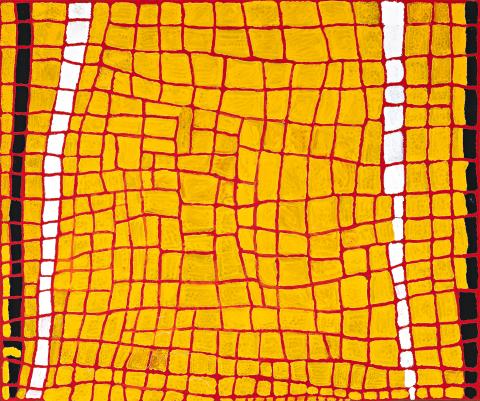MARRUWA, 2006
TJUMPO TJAPANANGKA
synthetic polymer paint on linen
150.0 x 180.0 cm
bears inscription verso: artist’s name, size and Warlayirti Artists cat. 869/06
Warlayirti Artists, Balgo Hills (cat. 869/06)
The Collection of Colin and Elizabeth Laverty, Sydney, acquired from the above in October 2006
This work is accompanied by a certificate of authenticity from Warlayirti Artists, Balgo Hills that states: ‘Tjumpo has painted some of his country, which is far to the south of Balgo, close to Wilkinkarra, or Lake Mackay. Marruwa is the general name for this country and is a major Tingarri, or men’s law place. The white shapes represent many lakes found in this country while the red lines depict tali or sandhills.’
Tjumpo was a senior law man and a Maparn (healer), with a very charismatic personality. An indefatigable traveller and a true desert man, Tjumpo spent his childhood hunting in the Gibson Desert and Great Sandy Desert before moving to the Balgo Mission, where he began painting for Warlayirti Artists in 1986. His work was included in the seminal exhibition Art from the Great Sandy Desert at the Art Gallery of Western Australia. While his painting style is true to the Wirrimanu aesthetic, his work also signals the influence of the art movement at Papunya Tula.
Marruwa is an exceptional example of Tjumpo’s latest style, painted only one year before his death. The vibrant, bright yellow field with a reticulation of red lines depict a traditional map of the artist’s country, whilst the use of only four primary colours with a black and a white band on either side conveys an effect of striking modernity. A smaller closely related painting from the same year housed in the National Gallery of Victoria collection presents an equivalent yellow and red field as found in the current work.
Tjumpo has exhibited widely in Australia and overseas, and his work is held in all major Australian institutions, as well as in many significant foreign institutions.
